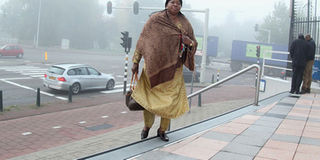Judges allow Uhuru Kenyatta to skip ICC sessions

International Criminal Court prosecutor Fatou Bensouda arrives at the court in The Hague on October 18, 2013. PHOTO | BILLY MUTAI |
What you need to know:
- A similar ruling in favour of a request by Deputy President William Ruto was overturned when a majority of the 18 ICC judges upheld the prosecutor’s appeal
- President Kenyatta’s lawyers had argued that the demands of the presidency required his full attention
President Uhuru Kenyatta will not have to attend all sessions during his trial for crimes against humanity charges by the ICC in The Hague.
The court, by a majority of two against one, ruled that President Kenyatta will only have to attend the opening and closing statements when victims are testifying.
Under the terms, the President will also have to be present in court when judgment is being delivered and, if convicted, for the sentencing and compensation hearings for victims of post election violence.
President Kenyatta’s trial is scheduled to start on November 12.
A similar ruling in favour of a request by Deputy President William Ruto was overturned when a majority of the 18 ICC judges upheld the prosecutor’s appeal.
It forced Mr Ruto to attend hearings currently going on in the Netherlands and only return to the country occasionally, like when terrorists temporarily took over the Westgate Mall in Westlands last month killing 67 people.
Mr Ruto was in the country again two weeks ago when President Kenyatta travelled to Addis Ababa for an extraordinary AU summit on relations with the court. (READ: Welcome and goodbye)
The AU resolved that President Kenyatta and Mr Ruto should not attend the hearings until the UN Security Council responded to their request for the cases to be stopped.
Judges Chile Eboe-Osuji and Robert Fremr concurred with the application by Mr Kenyatta’s lawyers while, just like in the Ruto case, Judge Kuniko Ozaki, disagreed with the decision.
The majority, however, required Mr Kenyatta’s physical presence for the entirety of the following sessions — the opening and closing statements of all parties and participants; hearings when victims present their views and concerns in person; the delivery of judgment in his case; and any other attendance ordered by the Chamber.
The judges added: “If applicable, Mr Kenyatta is also required to be present during sentencing hearings, the delivery of sentencing, the entirety of victim impact hearings, as well as reparation hearings.”
They said they had excused Mr Kenyatta from attending all trials only to ensure fairness and to expedite the trial, but also to protect the rights and protection of victims and witnesses.
President Kenyatta’s lawyers had argued that the demands of the presidency required his full attention.
VIDEO LINK
They had also wanted the President to attend trial through video link, if needed, from Nairobi. In the application, President Kenyatta said he had confidence his lawyers would represent him effectively at the trial and he did not have to be physically present.
A statement issued by the ICC yesterday said: “Today, 18 October 2013, Trial Chamber V(b) of the International Criminal Court issued its decision conditionally granting, the request to excuse Uhuru Muigai Kenyatta from continuous presence at his trial, scheduled to start on 12 November 2013. The decision was adopted by majority, Presiding Judge Kuniko Ozaki dissenting.
“The majority asserted that violations of any conditions of Mr Kenyatta’s excusal may result in revocation of the partially granted request, and/or the issuance of an arrest warrant, where appropriate.”
As the decision was being made, Foreign Cabinet Secretary Amina Mohamed was in the UK campaigning to have the UN Security Council support deferment of the cases to Kenya.
Britain’s minister for Africa, Mr Mark Simmonds, issued a statement saying he “welcomed President Kenyatta’s and Mr Ruto’s continued commitment to cooperate with the ICC”.
Meanwhile, a former ICC chief prosecutor has condemned the Kenyan cases, warning that the indictments could damage the fledgling international justice system.
Mr David Crane, the US lawyer who built the case against Liberia’s former president Charles Taylor, said his successors at The Hague had ignored political realities in pursuing the Kenyan prosecution, which he said “could be the beginning of a long slide into irrelevance for international law”.
“I would never have indicted or gotten involved in justice for the Kenyan tragedy,” said Mr Crane, a former chief prosecutor of the special court for Sierra Leone, a precursor to the ICC. “It’s placed them in a situation where they are damned if they do or don’t.”





